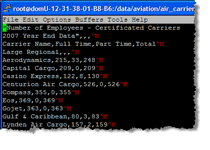Announcing Kirix Strata 5.4.0
May 27th, 2025
 We’re excited to announce the release of Kirix Strata 5.4.0 — a major upgrade that brings long-awaited features, bug fixes, and expanded database support. Backed by generous development support from fopen GmbH, Kirix continues to grow into an even more powerful platform for data analysis.
We’re excited to announce the release of Kirix Strata 5.4.0 — a major upgrade that brings long-awaited features, bug fixes, and expanded database support. Backed by generous development support from fopen GmbH, Kirix continues to grow into an even more powerful platform for data analysis.
Here are the key highlights in version 5.4.0:
- Undo/Redo functionality. Easily reverse or reapply changes across your workspace.
- New Fixed Length and Delimited Text handling. These import tools have been redesigned for reliability and flexibility.
- Improved Copy/Paste between Kirix Strata and Excel. More accurate transfers of data across applications.
- Enhanced Relationship Manager. Better support for circular references and file movement within the database.
- Fixed spurious jumps in Filter Child Tables. No more unexpected navigation behavior when filtering.
- Added PostgreSQL database support. Connect and analyze PostgreSQL data natively.
- Graphical interface updates. Minor UI polish and usability improvements.
- Resolved "file in use" error. Fixed inaccurate locking error messages.
- Grouping and Summary now supported on filtered child tables. More flexible data aggregation.
- Report Writer fixes. Printer selection bugs have been resolved.
This release is part of our ongoing effort to support data professionals with high-performance, intuitive tools. Download the latest version here and experience the upgrades for yourself.
As always, we welcome your feedback!
P.S. Stay tuned to kirix.com and to tabulariq.com for more updates and insights into our ongoing development work.


 We're pleased to announce a minor upgrade to Kirix Strata today,
We're pleased to announce a minor upgrade to Kirix Strata today,

 In
In  We haven't been doing much regular blogging lately, but we're hoping this will change in the coming weeks.
We haven't been doing much regular blogging lately, but we're hoping this will change in the coming weeks.

